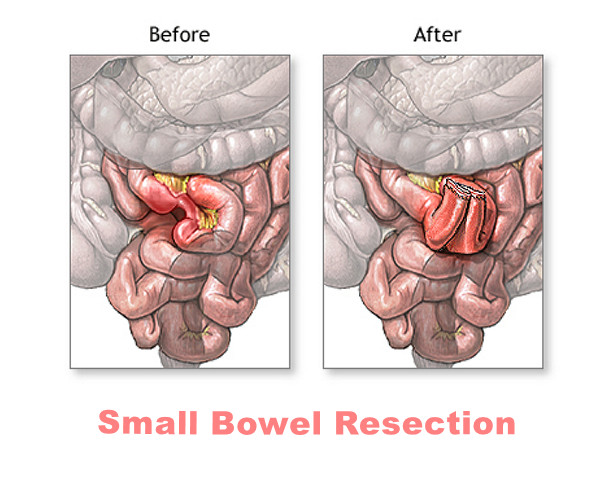Small resection is the general surgical procedure used to remove the small intestine for treating various ailments. To clearly understand the laparoscopic small bowel resection procedure you need to know about the small intestine. The small intestine is the long tube-like structure and can be divided into three parts:
- Duodenum: It is the first part of the intestine that joins the stomach to the small intestine. It acts as the entry point for the digestive enzymes.
- Jejunum: The middle section of the intestine, its basic work is to absorb the nutrient from the food and move the food through the bowel.
- Ileum: the last part of the small intestine and large intestine. It joins the small and large intestines.
After the removal of ileum for treating various diseases, there is a need for ileostomy for stool to exit the body after small bowel resection. In case the surgeon has reattached the ileum so that bowel movement can happen there is no need for an ileostomy.
Diseases that are treated by Small Bowel Resection
Laparoscopic small bowel resection procedures can be used to treat cancerous or precancerous diseases. Non-cancerous cases for which the Small bowel Resection is used:
- Bleeding
- Infections or severe ulcers
- Conditions like Crohn’s disease
- Regional ileitis and regional enteritis
- Bowel obstruction
- Certain birth defects
- Small intestine injury.
What are the risks of a small bowel resection?
Whether it is small bowel resection or laparoscopic splenectomy surgery complications are associated with all kind of surgical process. But with the best surgeon and proper doctor’s guidance, the chances of having a complication becomes low. Risk and Side-effect of small bowel resection:
- Reaction to Anesthesia
- Harm to nearby organs
- Bleeding
- Infection
- Blood clots
- Trouble breathing
- Heart attack/stroke
- Diarrhea
- Abdominal abscess
- Abdominal bleeding
- Incisional hernia
- Adhesion/scar tissue formation Bowel obstruction
- Short bowel syndrome
- Anastomotic leaks
- Incision re-opening
What is recovery like?
There is a various factor associated with the duration of recovery, but mostly it depends on the extent of the procedure. You can be asked to stay for a long time in the hospital, urinary catheter and nasogastric tube (NG) will place. A urinary catheter is used to collect and drain the in the external collection of the bag and a nasogastric tube will drain the contents of the stomach. During this time you may not be allowed to eat.
Taking care of Incision:
Incisions of the laparoscopic small bowel resection procedure need to be taken care of. The medical staff will teach you how to take good care of your stoma and clean your incision. Ask your medical team if you need medication to prevent pain, blood clots, infection, constipation or other conditions.
Things to Avoid after surgery:
You need to avoid doing certain activities for about 2-3 weeks after your laparoscopic small bowel resection procedure:
- Avoid heavy lifting
- Avoid strenuous activity like climbing
- Change your diet
- Avoid submerging incisions in the water tub
- Do not drive after taking narcotic medication
How can I care for myself?
You need to ask your family member or friend to help you for a few weeks to do the daily task after the laparoscopic small bowel resection procedure, it will take time to go back to normal activity. The pain, infection, and constipation can be avoided if you follow the instruction and take medication guided by the medical team.

